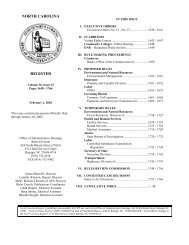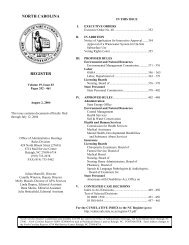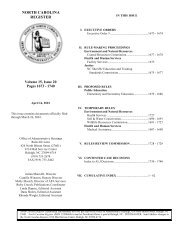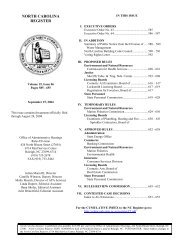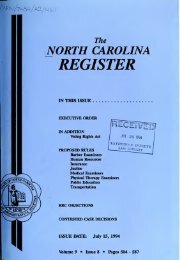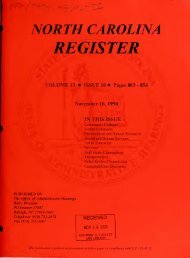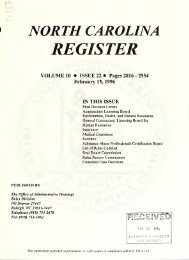NC Register Volume 23 Issue 09 - Office of Administrative Hearings
NC Register Volume 23 Issue 09 - Office of Administrative Hearings
NC Register Volume 23 Issue 09 - Office of Administrative Hearings
You also want an ePaper? Increase the reach of your titles
YUMPU automatically turns print PDFs into web optimized ePapers that Google loves.
APPROVED RULES<br />
10A <strong>NC</strong>AC 70I .0102 LICENSING PROCESS<br />
(a) The license process for a residential child-care facility shall<br />
consist <strong>of</strong> an application phase, an investigatory phase and a<br />
decision making phase.<br />
(b) Application Phase. An applicant shall apply for a license to<br />
operate a residential child-care facility to the licensing authority<br />
prior to the first child being accepted for full-time care. An<br />
applicant shall apply for renewal <strong>of</strong> a license to operate a<br />
residential child-care facility to the licensing authority prior to<br />
the expiration <strong>of</strong> the current license.<br />
(c) Investigatory Phase. During the investigatory phase, the<br />
applicant shall submit to the licensing authority information on<br />
the proposed program and projected methods <strong>of</strong> operation. For<br />
proposed private and public residential child-care facilities, the<br />
licensing authority staff, together with those seeking licensure,<br />
shall complete the investigatory phase<br />
(d) Decision Regarding Licensure. An applicant shall submit all<br />
the materials required by Subchapters 70I and 70J, to the<br />
licensing authority prior to the decision to issue a license to<br />
operate.<br />
History Note: Authority G.S. 131D-10.5; 143B-153;<br />
Eff. July 1, 1999 (See S.L. 1999, c. <strong>23</strong>7, s. 11.30);<br />
Amended Eff. October 1, 2008; July 18, 2002.<br />
10A <strong>NC</strong>AC 70I .0201 DEFINITIONS<br />
In addition to the definitions found in G.S. 131D–10.2, the<br />
following definitions apply to the rules in Subchapters 70I and<br />
70J <strong>of</strong> this Chapter.<br />
(1) "Child-caring institution" means a residential<br />
child-care facility utilizing permanent<br />
buildings located on one site for 13 or more<br />
foster children.<br />
(2) "Children's foster care camp" means a<br />
residential child-care facility that provides<br />
foster care at either a permanent camp site or<br />
in a wilderness setting.<br />
(3) "Direct service personnel" means staff<br />
responsible for the direct services provided to<br />
children and their families including child-care<br />
workers, residential counselors,<br />
house/teaching parents, social workers,<br />
recreation and education staff.<br />
(4) "Emergency shelter care" means 24 hour care<br />
provided in a residential child-care facility for<br />
a period not to exceed 90 days, in accordance<br />
with 10A <strong>NC</strong>AC 70J .0200.<br />
(5) "Executive director" means the person who is<br />
in charge <strong>of</strong> the agency and who is responsible<br />
for developing and supervising the program <strong>of</strong><br />
residential child-care and services.<br />
(6) "Foster child" means an individual less than 18<br />
years <strong>of</strong> age who has not been emancipated<br />
under North Carolina law, or one who is 18 to<br />
21 years <strong>of</strong> age and continues to reside in a<br />
residential child-care facility, who is<br />
dependent, neglected, abused, abandoned,<br />
destitute, orphaned, undisciplined, delinquent,<br />
or otherwise in need <strong>of</strong> care away from home<br />
and not held in detention.<br />
(7) "Full license" means a license issued for two<br />
years when all licensing requirements are met.<br />
(8) "Group home" means a residential child-care<br />
facility operated either under public or private<br />
auspices that receives for 24-hour care no<br />
more than 12 children. This number includes<br />
the caregivers' own children and other relative<br />
children residing in the home under the age <strong>of</strong><br />
18. The composition <strong>of</strong> the group shall<br />
include no more than two children under the<br />
age <strong>of</strong> two, four children under the age <strong>of</strong> six,<br />
and six children under the age <strong>of</strong> 12. A group<br />
home shall not provide day care, nor shall it be<br />
available to adults in the community who wish<br />
to rent rooms.<br />
(9) "License" means permission granted in writing<br />
to a corporation, agency or county government<br />
by the licensing authority to engage in the<br />
provision <strong>of</strong> full-time residential child-care or<br />
child-placing activities based upon an initial<br />
determination, and biennially thereafter, that<br />
such corporation, agency, or a county<br />
government has met and complied with<br />
standards set forth in this Subchapter.<br />
(10) "Licensing authority" means the North<br />
Carolina Department <strong>of</strong> Health and Human<br />
Services, Division <strong>of</strong> Social Services.<br />
(11) "Licensed medical provider" means a<br />
physician, physician's assistant or certified<br />
nurse practitioner.<br />
(12) "Out-<strong>of</strong>-home family services agreement"<br />
means a document developed with the child's<br />
custodian that identifies a child's permanency<br />
plan (return to parents, placement with<br />
relatives, guardianship, and adoption). The<br />
out-<strong>of</strong>-home family services agreement<br />
describes a child's needs, goals and objectives<br />
in a residential child-care facility and the tasks<br />
and assignments <strong>of</strong> the staff <strong>of</strong> the residential<br />
child-care facility to meet a child's and<br />
family's needs, goals and objectives. The out<strong>of</strong>-home<br />
family services agreement specify<br />
what must change in order for the parents to<br />
meet the needs <strong>of</strong> the child. Basic goal<br />
planning steps include:<br />
(a) involving the family in the process;<br />
(b) identifying goals that are both<br />
realistic and achievable;<br />
(c) using family strengths when outlining<br />
objectives and activities to attain the<br />
goals;<br />
(d) spelling out the steps necessary for<br />
success;<br />
(e) documenting who will do what and<br />
when they will do it; and<br />
(f) providing for review.<br />
<strong>23</strong>:<strong>09</strong> NORTH CAROLINA REGISTER NOVEMBER 3, 2008<br />
814




